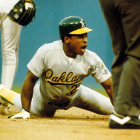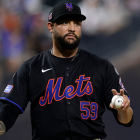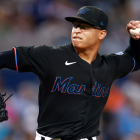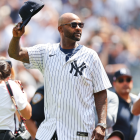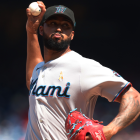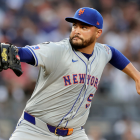While it might not be the most exciting day on baseball's offseason calendar, Friday brought a pretty significant deadline for teams and players around the league. It was the deadline for clubs and their arbitration-eligible players to file salary figures for 2018. The player filed what he feels he should be paid this coming season while the team files what they feel he should be paid. Simple, right?
There were 204 arbitration-eligible players around the league this offseason, and the vast majority of those 204 players agreed to new contracts before Friday's deadline. That is not at all unusual. No one likes going through the arbitration process -- even filing salary figures can be a pain -- so the two sides do all they can to hammer out a new contract. If necessary, arbitration hearings will take place throughout February.
As a reminder, players with more than three years but less than six years of service time are eligible for arbitration. Some players can become arbitration eligible with slightly less than three full years of service time -- those players are known as "Super Two" and they go through arbitration four times instead of the usual three. Players with at least six years of service time are eligible for free agency. Here is everything you need to know about arbitration salary filing day 2018:
Donaldson set an arbitration record
Prior to the 1 p.m. ET deadline, the Blue Jays and Josh Donaldson agreed to an arbitration record $23 million salary for the 2018 season. That is the largest salary ever given to a player on a one-year contract in his years of arbitration eligibility. Donaldson was arbitration-eligible for the final time and will become a free agent following this season.
It is worth noting Donaldson is a Super Two who went through arbitration four times rather than the usual three. That increased his overall earning potential and contributed to his record salary, as did his overall excellence and 2015 MVP award. Here are the five largest one-year contract arbitration salaries of all-time:
- Josh Donaldson, 2018 Blue Jays: $23 million
- Bryce Harper, 2018 Nationals: $21.625 million
- David Price, 2015 Tigers: $19.75 million
- Prince Fielder, 2011 Brewers: $15.5 million
- Max Scherzer, 2014 Tigers: $15.25 million
Harper signed his 2018 contract back in May 2017. Other potential arbitration record breakers like Angels center fielder Mike Trout and former Giants right-hander Tim Lincecum agreed to multiyear contracts back in the day. Both Trout (multiple MVPs) and Lincecum (multiple Cy Youngs) would've gone to arbitration with unprecedented credentials and undoubtedly set contract records had they not signed multiyear deals.
Bryant also set an arbitration record
Donaldson was not the only player to sign a record contract Friday. Cubs third baseman Kris Bryant also received a record payout. His contract set a new record for a player in his first year of arbitration eligibility.
Bryant gets first-year arb record $10.85 million. #Cubs
— Gordon Wittenmyer (@GDubCub) January 12, 2018
The previous record for a player in his first year of arbitration eligibility was Ryan Howard's $10 million salary with the 2010 Phillies. Like Bryant, Howard went into arbitration with Rookie of the Year and MVP awards to his name.
Last season Bryant made $1.05 million, which was a record salary for a player in his pre-arbitration years. It should be noted Bryant, like Donaldson, is a Super Two. This was the first of Bryant's four trips through arbitration. Chances are he will set more salary arbitration records in the coming years.
Machado and O's didn't agree to a contract ... then they did
Most teams these days employ a "file and trial" approach, meaning if the two sides do not agree to a contract and wind up filing salary figures, the club cuts off negotiations and they go to an arbitration hearing. The "file and trial" approach is designed to put some pressure on the player to sign. No one likes to go to a hearing, after all.
Orioles third baseman Manny Machado was arbitration-eligible for the third and final time this offseason, and prior to Friday's deadline, it was reported Machado and O's could not agree to a contract. The two sides would file salary figures and go to an arbitration hearing next month.
According to a source, the Orioles and Manny Machado will not settle before today’s 1pm ET filing deadline.
— Mark Feinsand (@Feinsand) January 12, 2018
A few hours later, that all changed. The O's and Machado apparently came to their senses and hammered out a one-year agreement for 2018, a one-year agreement that will pay Machado a healthy $16 million.
Orioles and Manny Machado have come to terms on a $16 million deal for 2018, per source. Deal also includes incentives for awards.
— Mark Feinsand (@Feinsand) January 12, 2018
For those wondering what happened with Machado, his camp and the Orioles did in fact file numbers after the 1pm ET deadline. Baltimore went back to Machado's agent one more time after the filing and the deal was struck. Went away from its standard file-and-trial approach.
— Mark Feinsand (@Feinsand) January 12, 2018
Machado's $16 million salary is now the fourth highest one-year contract salary for a player in his arbitration years. It slots in between 2015 David Price ($19.75 million) and 2011 Prince Fielder ($15.5 million) in the list presented earlier in this post.
Cole's 2018 salary is now set
This has been a very busy offseason for Pirates right-hander Gerrit Cole even though he hasn't moved yet. Cole has been involved in all sorts of trade rumors, mostly with the Yankees and Astros. At one point earlier this week it appeared he was on the verge of being send to Houston, though that was a false alarm.
On Friday, the Pirates and Cole worked out a one-year contract that set his salary for the 2018 season.
#Pirates sign Gerrit Cole to $6.75 million deal, a raise of $3 million
— Rob Biertempfel (@BiertempfelTrib) January 12, 2018
The $6.75 million salary is not a record or even particularly notable for a starting pitcher in his second year of arbitration eligibility. What this means, however, is that prospective trade partners now know what they'll have to pay Cole this coming season. That is especially important to the Yankees, who are trying like crazy to get under the $197 million luxury tax threshold in 2018. Cole's salary was a mystery prior to Friday's agreement.
Several big name arbitration-eligible players remain unsigned
Most arbitration-eligible players signed prior to Friday's deadline. A handful did not. There are always a few who slip through the cracks. Here are the most notable players who were unable to reach a contract agreement with their team prior to Friday's deadline, and instead filed salary figures according to multiple reports:
| Year of Eligibility | Player Filed | Team Filed | |
|---|---|---|---|
Trevor Bauer, CLE | Second time as Super Two | $6.525 million | $5.3 million |
Mookie Betts, BOS | First time | $10.5 million | $7.5 million |
Kevin Gausman, BAL | Second time as Super Two | $6.225 million | $5.3 million |
Ken Giles, HOU | First time | $4.6 million | $4.2 million |
Jake Odorizzi, TB | Second time | $6.3 million | $6.05 million |
Roberto Osuna, TOR | First time | $5.8 million | $5.3 million |
J.T. Realmuto, MIA | First time | $3.5 million | $2.9 million |
Jonathan Schoop, BAL | Second time | $9 million | $7.5 million |
George Springer, HOU | Second time as Super Two | $10.5 million | $8.5 million |
Marcus Stroman, TOR | Second time as Super Two | $6.9 million | $5.5 million |
As a reminder, Friday's deadline was not a hard deadline. Unsigned arbitration-eligible players and their teams can still negotiate a contract of any size prior to a hearing. Like I said though, just about every club these days employs a "file and trial" approach.
At the arbitration hearing, each side will make a case for their salary filing figure, and the three-personal arbitration panel will select either the team's filing number or the player's filing number. Nothing in between. The panel's decision will then be the player's 2018 salary.










